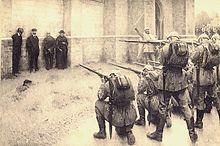
Back استباحة بلجيكا Arabic Violació de Bèlgica Catalan Voldtægten af Belgien Danish Rape of Belgium German Violación de Bélgica Spanish تجاوز به بلژیک Persian Saksan sotarikokset Belgiassa ensimmäisessä maailmansodassa Finnish Viol de la Belgique French אונס בלגיה HE Pemerkosaan Belgia ID
| Rape of Belgium | |
|---|---|
| Part of the German occupation of Belgium during World War I | |
 Depiction of the mass murder of civilians in Blégny by Évariste Carpentier | |
| Location | Belgium |
| Date | 4 August 1914-23 November 1918 |
| Target | Belgian civilians |
Attack type | War crime, mass murder, forced labour |
| Deaths | At least 23,700 killed |
| Injured | 33,100 |
| Victims | 120,000 subjected to forced labour and deported to Germany[1][2] |
| Perpetrators | Imperial German Army |
The Rape of Belgium was a series of systematic war crimes, especially mass murder and deportation, by German troops against Belgian civilians during the invasion and occupation of Belgium during World War I.
The neutrality of Belgium had been guaranteed by the Treaty of London of 1839, which had been signed by Prussia. However, the German Schlieffen Plan required that German armed forces advance through Belgium (thus violating its neutrality) in order to outflank the French Army, concentrated in eastern France. The German Chancellor, Theobald von Bethmann Hollweg, dismissed the treaty of 1839 as a "scrap of paper".[3] Throughout the war, the German army systematically engaged in numerous atrocities against the civilian population of Belgium, including the intentional destruction of civilian property; German soldiers murdered over 6,000 Belgian civilians, and 17,700 died during expulsions, deportations, imprisonment, or death sentences by court.[4] The Wire of Death, maintained by the German Army to kill civilians trying to flee the occupation, was used to murder over 3,000 Belgian civilians, and 120,000 were forced to work and deported to Germany.[1][2] German forces destroyed 25,000 homes and other buildings in 837 communities in 1914 alone, and 1.5 million Belgians (20% of the entire population) fled from the invading German army.[5]: 13
- ^ a b Cook 2004, pp. 102–7.
- ^ a b De Schaepdrijver 2014, p. 54.
- ^ Memoirs of Prince Von Bulow: The World War and Germany's Collapse 1909–1919, translated by Geoffrey Dunlop and F. A. Voight, Little, Brown and Company, Boston, 1932:
There is no doubt that our invasion of Belgium, with violation it entailed of that country's sovereign neutrality, and of treaties we ourselves had signed, and the world had respected for a century, was an act of the gravest political significance. Bad was made worse than ever by Bethmans Hollweg's speech in the Reichstag (August 4, 1914). Never perhaps, has any other statesman at the head of a great and civilized people (...) pronounced (...) a more terrible speech. Before the whole world—before his country, this spokesman of the German Government—not of the Belgian!—not of the French!—declared that, in invading Belgium we did wrong, but that necessity knows no law (...) I was aware, with this one categorical statement, we had forfeited, at a blow, the imponderabilia; that this unbelievably stupid oration would set the whole world against Germany. And on the very evening after he made it this Chancellor of the German Empire, in a talk with Sir Edward Goschen, the British Ambassador, referred to the international obligations on which Belgium relied for her neutrality as "un chiffon de papier", "a scrap of paper"...
- ^ Annuaire statistique de la Belgique et du Congo Belge 1915–1919. Bruxelles. 1922 p.100
- ^ Lipkes J. (2007) Rehearsals: The German Army in Belgium, August 1914, Leuven University Press
© MMXXIII Rich X Search. We shall prevail. All rights reserved. Rich X Search